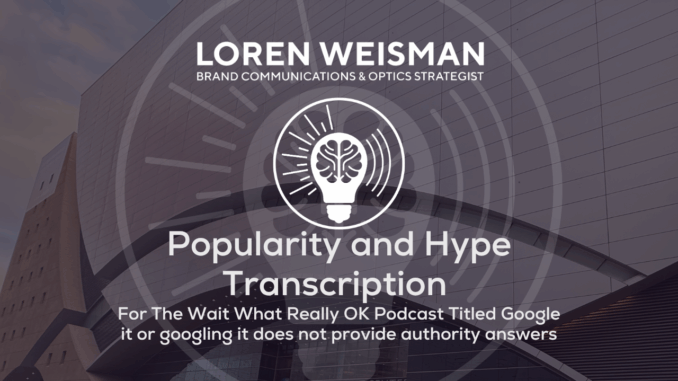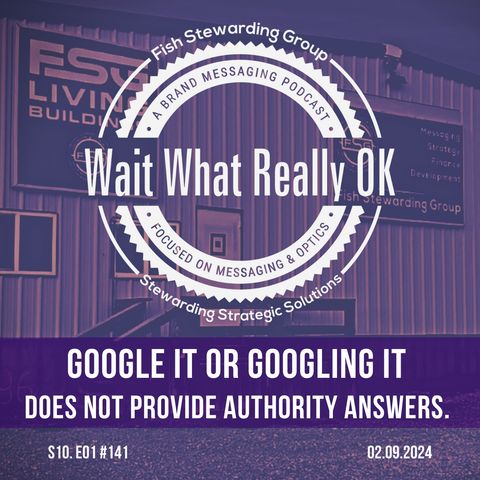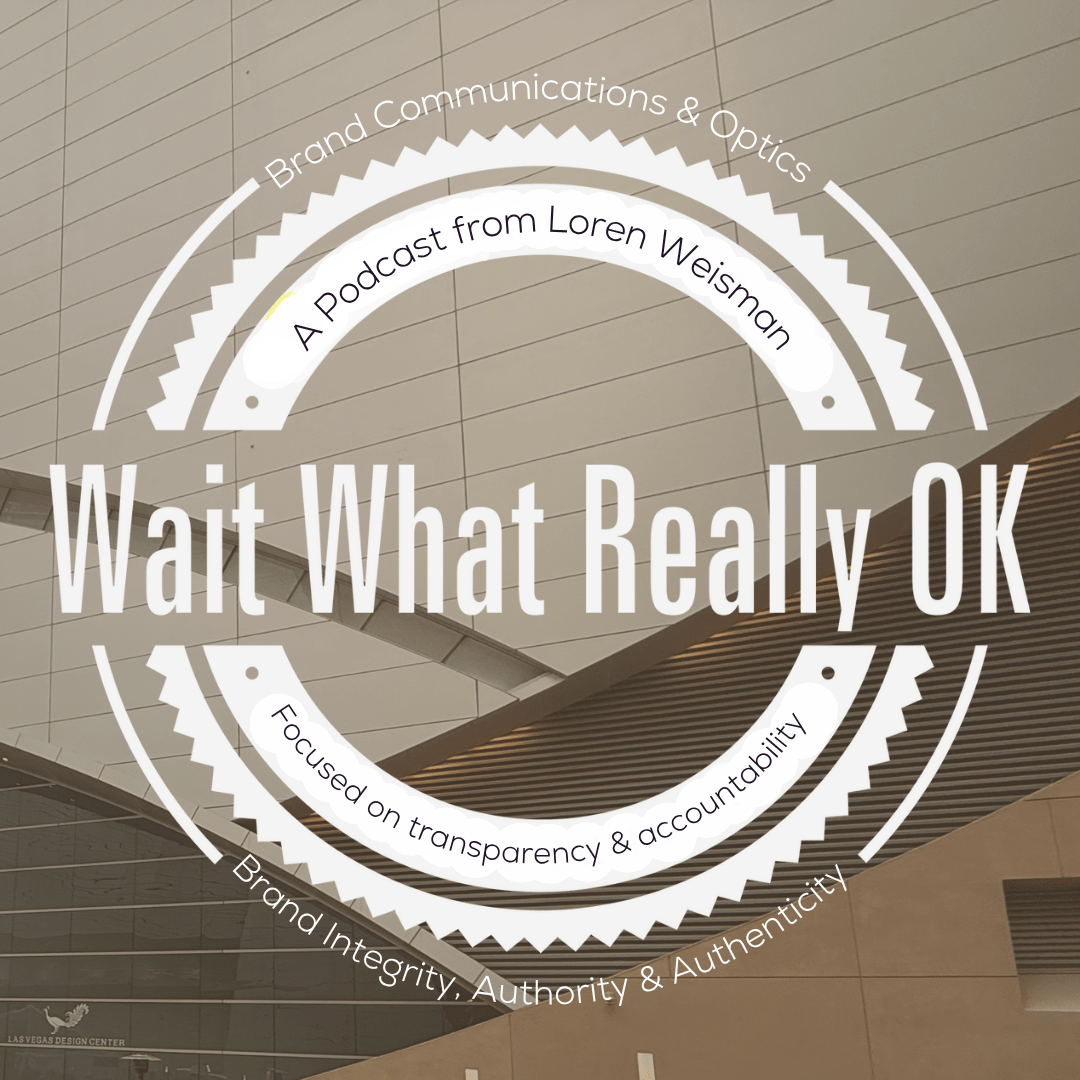
Popularity and Hype Transcription for The Wait What Really OK Podcast Titled Google it or googling it does not provide authority answers
 Popularity and Hype Transcription
Popularity and Hype Transcription

Released on February 9th, 2024
🎙️ Tune In:
Listen to this Wait What Really Ok Podcast Episode
Google it or googling it does not provide authority answers
on
Spotify
Apple Podcasts
Pandora
Amazon Music
Spreaker
YouTube
IMDB
and other platforms.
Popularity and Hype Transcription
Google it or googling it does not provide authority answers
Song: Wait What Really Ok Ok. With your host, Loren Weisman. This is a fully licensed theme song for the show about stuff that makes you say, wait, what? Really?
Loren: My name is Loren Weisman. This is the podcast Wait, what? Really? And this episode title is Google it or Googling it does not provide authority answers, or for that matter, authoritative answers. And we’re seeing more and more. Many people, when they push their promotion, they push their advertising. They, you know, whether it’s TikTok, Instagram, Facebook, in their short videos, in their long videos, in their streams, many are being told, google it. Oh, go Google it. Is this a good idea?
When you Google something, there are algorithms that will push down information, and not just false information, factual information. And oftentimes when somebody says Google it, maybe they have the corner market or the corner SEO on what they’re telling you to Google. At the same time, in misdirection, in what I call dark optics, if somebody has looked up certain things and the popularity stands at Google responding the first page to a whole bunch of false things, to a whole bunch of stuff that has been pushed up, and this is not conspiracy theory stuff, many false things are up there, Many fictional things are up there.
And when you Google it, you find false, altered facts, or for that matter, lies. The point being is, when you Google something, take the responsibility, take the accountability, take the authority that you have in yourself to not believe the first hit that comes up. Many of these pages that can come up, they’re working for that Google, they’re working for that search.
They want you to see it as fact. Well, it might be an ad or it might be redirection. Google this fact. Just because something comes up as the number one result does not make it an objective fact. And there’s a very good chance it could be a subjective opinion that has been moved up and placed up by somebody that knows SEO really well and is pushing, for that matter, an optic, a message, a marketing that isn’t necessarily true. The problem in this side, many people fall for it.
Popularity and Hype Transcription Continued:
So in the simplicity of it, or to kind of summarize where this whole thing is going right here in the beginning, when you choose to Google something or somebody says Google this, look to what’s showing up, look to where it’s showing up, look to how it’s showing up, and look for many sources, quality sources, that showcase that that is or isn’t an objective fact. If you Google certain things, a whole bunch of stuff can come up. And oftentimes, and this was really big a couple years back, it’s about 10 years back, eight years back when that CBD push was really happening. Google this, this is where the facts, this is the results from these labs. And many people found out as they dug deeper and it also got them in trouble. And it’s also hurt the full legalization and the broader legalization of CBD, of marijuana, of that stuff that has not had the impact that they intended because of many of these people lying.
I feel if they had told the truth and they showcased transparency elements of those products would be further along than they are currently. Another story, another podcast. Point being people were googling stuff, they were seeing falsified results from labs that belong to the company that was selling. The same thing happens inside of the news cycle, inside of the trending cycle.
This is a fact. Google it. And then you find out that the owner of that given domain, that sub domain, that little one page website, that thing where they’re garnering facts and it looks like an educational thing, it’s coming from them. The point being when you dig a little bit deeper, when you look to the sources, when you look to see if the source is a genuine source or not, then when you’re googling, when you’re searching, you can find something that has a greater quality, a greater stability and for that matter, a greater authority. When we dig in, when we google something, is it coming from pages that look really pretty or is it coming from a true place?
It’s strange right now and being in the election season, this is this and Google it and you’ll see these reports. Well, if it’s from a biased school, a biased news source, whether far left, far right, right in the middle, how are you getting a fact over necessarily getting the tone or the message that they want you to get. Point being, take the time. If you are truly authentically looking for truth and not just the first thing thrown out at you, look deeper and if you are trying to share an objective fact showcase where people can find this, maybe you say, hey Google this, but look at these resources, look. And yes, there are some very high end sources that are biased.
 Popularity and Hype Transcription Continued:
Popularity and Hype Transcription Continued:
However, if it’s in a number of places, if it’s in a number of places, from biased to non biased, here, there, then you can run with that. Otherwise state it as an opinion. We’re in a time where so many unfortunately are trying to take their opinions and shift them into facts and that’s how they run them over the news cycle. They begin to create stories of what they want the end result to be. It’s unfortunate that’s an objective fact. So how do we counter that? Oh, news is broken. That doesn’t help us in our research. It doesn’t help if you’re sitting here looking and trusting the first page. It doesn’t help these, these life coaches spewing this constant motivational, this is what you need to do. This is how you need to do it. Google this. Great. A whole page comes up with all sorts of hype, stuff that has no substance to it whatsoever.
It’s the same thing with these people that are out there bragging going, I read 15 books a month and that’s how I build my authority. What if you’re reading 15 fictional trash books a month? What if you’re reading books that were created by some dude that popped 10 chapters and had AI wrote it? What if you’re reading from someone that has no education, no authority, no professionalism and no knowledge in that given industry, then what you’ve read is a waste. The same thing happens inside of Google. Well, I googled it and found this.
When somebody tells me I googled this and here’s the result I got, my first question is always, how many different results did you get? How many places in harmony did, how many places was that in harmony? What do you find contradicting it? Take the time to research information, whether it’s for your business, whether it’s for you personally, whether it’s for your conversations, your communication or for that matter, your content. Consider for these content curators and content creator, consider having a moment of silence, a moment of research. And before you share that hot tweet or that latest thing that popped up in Google, check to see if it’s of any value.
Instead of calling it breaking and news and source and look at what’s happening. You’re only spreading lies when you are lied to and share it without checking to see if it’s true. We’ve come into a rushed generation and many people also at the same time, there’s certain things they want to believe. They see something that hits their perceptions, they see something that hits what they want to be true and then they share it is true. That makes it dangerous. I wish, and I know this is completely unrealistic, I wish that social media had an aspect of liability, had an aspect of liability for people posting stuff not as opinion but as fact. And that it was X number of flags and then you were flagged as someone going, this person you know is flagged for sharing things that aren’t necessarily true. Yes, there’s community notes, but even inside of community Notes and Twitter and many of these other things. So much flies under the radar that gets through that is absolutely not true. And inside that popularity.
Popularity and Hype Transcription Continued:
Well, we found this on these 10 different sources. But if they were all made up sources trying to push a particular lie, how does that help? I’m not trying to be confusing, I’m not trying to be conspiracy theorist. I’m not trying to push against Google. Right now we have what we have online. AI is a problem. These false sites, these false people online, they are a problem when it comes to Twitter, when it comes to some of these other sites to actually have to pay something, I kind of agree with it. I think that it’d be nice to have some kind of source and some kind of place where I know for sure that that’s an individual, I know who that is or if they’re going to remain anonymous, that behind the scenes they there’s some kind of proof and vetted fact that this person is, they are and not just another contrived bot that’s going to come up to support a story, a message, a theme, a campaign, a trend, an ad, and then disappear or become something else.
 Same thing here goes inside of reviews. We have a million reviews on Amazon right now inside of certain testing. And this is going on a completely different, in a completely different direction. You have many of these where 30%, 40%, 50% are made up reviews. One of the number one things I think is really important when it comes on the Amazon. You see something that’s beginning to get really good, something that’s starting to get a whole bunch of good reviews and then it gets smashed with this really bad review. There’s your dark optic. Go check them, see how many reviews they have.
Same thing here goes inside of reviews. We have a million reviews on Amazon right now inside of certain testing. And this is going on a completely different, in a completely different direction. You have many of these where 30%, 40%, 50% are made up reviews. One of the number one things I think is really important when it comes on the Amazon. You see something that’s beginning to get really good, something that’s starting to get a whole bunch of good reviews and then it gets smashed with this really bad review. There’s your dark optic. Go check them, see how many reviews they have.
It’s interesting that you might end up finding that these people that have 30, 40, 50, 60 reviews ranging from three stars to five stars, ranging down, spending a little bit more time, great or bad, that then all of a sudden this one person comes in and they only have four reviews. Is that a bot? Is that something right now trying to tear them down or move them down from five stars, this is the same thing. Consider digging deeper. Whether it’s an item that you’re going to buy, whether it’s a truth that you want to believe, honor truth a little bit greater than just reading it from someone you like and believing it to be true.
And there are people that are amazingly detailed out there, but in the middle of their need to content curate, in the middle of feeling like they have to get up X number of tweets per day, their social media people or them themselves take an irresponsible approach of sharing something really quick and some of these people that are factual most of the time are sitting there sharing something because they think it’s a hot topic and it’s going to get a whole bunch of likes.
I’ve seen people where they’re like oh you know what you know and it’s deep in the comments after it’s had all these views and all these I found out this wasn’t true then why don’t you have the honor to take it down and not put that out there. And it brings me to my last point. There are many people right now putting up information, putting up aspects, supporting true optics, false optics, messaging, marketing, advertising that they don’t care about the message, they care about the click throughs, they care that I’m spreading the truth.
Popularity and Hype Transcription Continued:
Don’t forget to like subscribe and comment. They want to make, they want to monetize and they’re monetizing off of lies and as you share their information it’s hurting your reputation in the end and you’re only monetizing a lie in close. Take the time if you’re going to share something and if you’re not, 100 second to last thing before last thing if you’re going to share something and you’re not 100% sure that it’s true, if you’re going to share something and you would not bet your reputation, your business or your professionalism on it then add that I saw this. I’m still looking to see if this is a fact or opinion. Does anybody know anything about this? Can somebody point me to links, other stories? What do you see from this? That’s a lot more honest, that’s a lot more transparent and true over these people that are just sharing it out. Can you believe this? And then you look at the sources and it packs it backs to TikTok.
I’m sorry, an 18 year old in their basement that’s trying to monetize and they’ve done a lot better and they’re making a lot more money than me. Good for them. But I would never do that because from where I stand I believe that’s immoral, I believe it’s unethical, I believe it’s unprofessional, I believe it harms people. So if you’re not 100% sure and for whatever reason you want to share that then preface it or close with it and stating I’m seeing this.
Are you seeing this to have the humility and just that, authenticity to say, I’m not 100% sure. Then on the counter side of that, when you share something that you know to be an absolute fact, maybe in the comments sections below, hit a couple different places where, you know, where you found that to be a fact, where maybe as opposed to just googling it on the first page, you found it. It came back to this study here, it came back to that study there, it came back here, it came back there. Here’s where this person said, here’s this information.
We are in a time of more misinformation, I believe, than ever in history. And misinformation is not a new thing. Go back to the Romans, the man that was the newsreader. The information would come through the Senate, through whoever, through, you know, the Caesar of the time, alter, edit and share what they wanted the public to know or the public to believe, for them to make the moves that they wanted to make. And hopefully in certain cases, and for them, hopefully in certain cases, to make a lie become the truth. In these times with social media, it’s turned into the same thing. There are many out there pushing lies that they’re focusing on people just sharing it to compound a lie, to appear as a truth. And they’re using many of you to help them take this lie to that truth.
So when you Google, dig deeper, if you’re asking somebody to look something up, as opposed to just a week, oh, Google this so that it comes to the most top popular information, top informational piece, have them double check through a series of sources, maybe on your website, if you’re a professional, share the sources where you have it. Stop with the claims, stop with the overstated hype, stop with the lying. We can earn money, we can make livings, and we can do it with an ethical, grounded, authentic and authoritative vibe, with a stand, as opposed to just trying to excite someone to click through, to subscribe, to pay you.
Now, I get that’s not for everyone. And I get a lot of people out there have no care for any ethics, for morals, for professionalism. But maybe, just maybe, be that person, be one of that limited few that when they speak or when you speak the truth, you can back it up. And if you’re not 100% sure, if you wouldn’t bet your reputation, for that matter, your life on it, state it as a opinion and share why it’s your opinion. And in that authenticity, I believe that sets you apart and grows a much greater authority and a greater accountability and a transparency for who you are, what you represent, and what you believe. I hope this rant made a little bit of sense. My name is Loren Weisman. This is the FSG messaging and Optics podcast. Wait What Really Ok. That’s all I got.
Popularity and Hype Transcription

